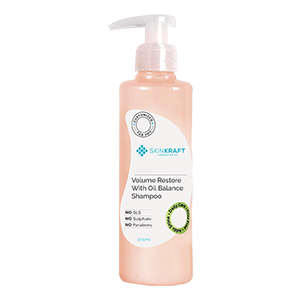If there was a way to swap hair breakage with strong hair, would you be the first one in the queue? Well, achieving and maintaining healthy hair, free of breakage is no mean feat. It takes a consistently healthy diet and the right hair care regimen to gain back your hair’s natural strength.
In this article, we have explained why hair breakage occurs, how you can treat it and tips to retain your hair’s health.
Highlights:
What Is Hair Breakage?

Your hair is made up of scales. Every strand of hair has overlapping scales that prevent your hair from breaking. When these scales become weak, it leads to hair breakage, which usually occurs at the shafts. It can make your hair extremely dry, frizzy and prone to split ends.
Why Is My Hair Breaking?
From your lifestyle to medical conditions, there can be a number of reasons why your hair is breaking. Here are some of the most common causes:
1. Improper Diet
Restricted diets can actually do more harm than good to your hair. Make sure you’re getting enough nutrients, vitamins and minerals that contribute to healthy hair and skin. Some vital nutrients include iron, zinc and folic acid. Consume foods that are rich in antioxidants and proteins as well.
Note:
Eating disorders can also contribute to hair breakage. Somebody with an eating disorder may not be consuming the right amount of nutrients required for the hair. This can restrict its proper growth and thus, you may notice your hair breaking off easily.
2. Dryness
Dry and brittle hair is prone to damage and breakage. A number of factors that can worsen this condition include using harsh products, shampooing your hair too often and washing it with hot water. Not using a conditioner after you have cleansed your scalp can also contribute to dryness and breakage.
3. Brushing Too Hard
Brushing your hair too hard can result in broken strands of hair. It can also pull out your hair from its roots, damaging it. The American Academy of Dermatology recommends that you brush your hair gently only when you need to style it while stepping out. 100 strokes a day is a myth.
4. Styling Tools That Produce Heat
Exposing your hair to extreme temperatures can cause your scales to fall apart and break. Avoid using such tools too often. Let your hair breathe. Investing in a heat protectant can also prevent these tools from damaging your hair.
5. Chemically Treating Your Hair Too Often
Chemical treatments like relaxations, coloring, or perming your hair among others can cause it to break. Chemically treating your hair too often means exposing it to harmful chemicals and even heat that can damage it considerably. It is advised that if you have chemically treated your hair, avoid doing so at least for 6-7 months.
6. Not Letting It Dry Naturally
Letting your hair dry naturally is important to avoid long-term damage. Your hair is in a vulnerable state when you’re out of the shower. Rubbing your hair with towels or using heat can actually damage your hair.
7. Tying Up Your Hair Too Often
Apart from just pulling your hair from your roots, tying your hair up regularly can also cause it to get tangled and break easily. Leaving it loosely tied is the best way to go for your everyday regime.
8. Hypothyroidism
Hypothyroidism is a condition in which your thyroid glands refrain from producing a proper amount of thyroid hormones. Thyroid hormones are vital for hair growth. A lack of thyroid hormone can result in hair damage and even hair loss.
How Do I Know If I Have Hair Breakage?
- If you notice split ends, you probably have a hair breakage issue.
- Check your hair for fallouts. Small, short and broken pieces of hair can mean that you’re dealing with a breakage issue.
- If your hair appears to be too dry, it is likely that you’re dealing with a breakage issue.
- Healthy hair doesn’t tangle easily. If your hair tangles and you find it difficult to comb, you may be dealing with a breakage issue.
- How does your hair feel at the crown as compared to the neck? If you feel that your hair is brittle as you run your fingers through it, you may be having a breakage issue.
How To Treat Hair Breakage?
1. Include Vitamins In Diet

Vitamins C, D3 and biotin can help reduce hair breakage by improving its health (1). Include foods rich in these nutrients in your diet for good hair. They are also available in supplements form if you are unable to consume such foods or have a deficiency.
Vitamin C can contribute to collagen production, which is responsible to form the base of blood vessels in your skin. Vitamin D3 enhances the production of keratin, a fibrous protein that makes up most of the hair. Biotin is vital to improve hair growth. Studies suggest that its deficiency can contribute to considerable amounts of hair fall (2).
2. Follow A Good Hair Care Routine
Massage your scalp regularly with essential oil to increase blood flow to your follicles. This will help strengthen your hair follicles and prevent breakage.
Shampoos help in cleansing your scalp which is vital to get rid of excess oil. Using it at least twice or thrice a week is recommended. Follow up your shampoo session with a conditioner as they provide nutrients to your hair, keeping it smooth and easy to manage. Post wash, let your hair air dry naturally.
3. Deep-Condition Your Hair
Deep-conditioning provides your hair with the much-needed protein and nutrients. It helps in strengthening your hair and penetrating the nutrients deep into the shaft to repair damaged hair. Practicing deep-conditioning on a regular basis will make your hair softer and free of breakage.
You can buy a ready-made deep-conditioner formulated specifically for your hair type or try out these home remedies:
A. Coconut Oil

Coconut oil is vital to keep your hair hydrated. It contains lauric acid that is an antifungal. It can reduce symptoms associated with dandruff and other such scalp infections (3). This in turn helps in reducing breakage.
B. Castor Oil
Castor oil contains ricinoleic acid that helps in increasing blood flow to the scalp. Blood circulation is essential to impart strength to your hair follicles (4).
C. Egg Mask
Eggs are a rich source of protein that imparts strength to the hair. Eggs can keep your hair frizz-free and reduce breakage if applied regularly. They also contain antioxidants and possess anti-inflammatory properties, which help in reducing damage (5).
D. Apple Cider Vinegar
Apple cider vinegar is essential for improving damaged hair. It has pH-balancing properties that are vital to maintaining your scalp health. Apple cider vinegar also contains antifungal properties that help reduce dandruff-related symptoms like dryness and flakiness (6). Overall, it keeps your hair soft and free of breakage.
4. Try Essential Oils Mixed With A Carrier Oil
A. Almond Essential Oil
This oil contains oleic acid, linoleic acid and other compounds that help retain the moisture and lipid metabolism balance in your hair. It helps to reduce breakage and softens the hair as well.
B. Chamomile Essential Oil
The anti-inflammatory and moisturizing properties of this oil is what makes it effective in reducing breakage. It can help treat inflammation caused by fungal infections on your scalp and contribute to hydrating your hair.
How To Prevent Hair Breakage?
- Shampoo and condition your hair regularly and gently. Don’t scrub too hard.
- Avoid using a rough towel to dry your hair.
- Avoid tying your hair up too often.
- Follow a proper balanced diet rich in essential nutrients.
- Allow your hair to dry up naturally as often as possible.
What Is The Difference Between Hair Fall And Hair Breakage?
Hair Fall
Hair fall is a condition that occurs when your hair falls out from its roots. All of us have hair fall, up to about 100 strands a day. However, certain conditions may cause you to lose excess amounts of hair. These conditions include alopecia, hypothyroidism and other medical conditions.
Hair Breakage
If your hair is dry and brittle, you may notice it breaking from its shaft. Hair breakage doesn't cause balding. It can be determined by split ends, frizzy hair and rough texture. Hair breakage is usually not that big a cause of concern as compared to hair loss. It can also be addressed easily.
Wrapping Up
Dry, frizzy and rough hair can mean that you’re experiencing hair breakage. Lifestyle, medical and other such factors can contribute to hair breakage. Maintaining a good hair care routine, eating well, keeping your hair hydrated and providing it with the necessary nutrients is important to prevent it from breaking.
Recommended Products
Was this Article helpful?
- Least helpful
- Most helpful





